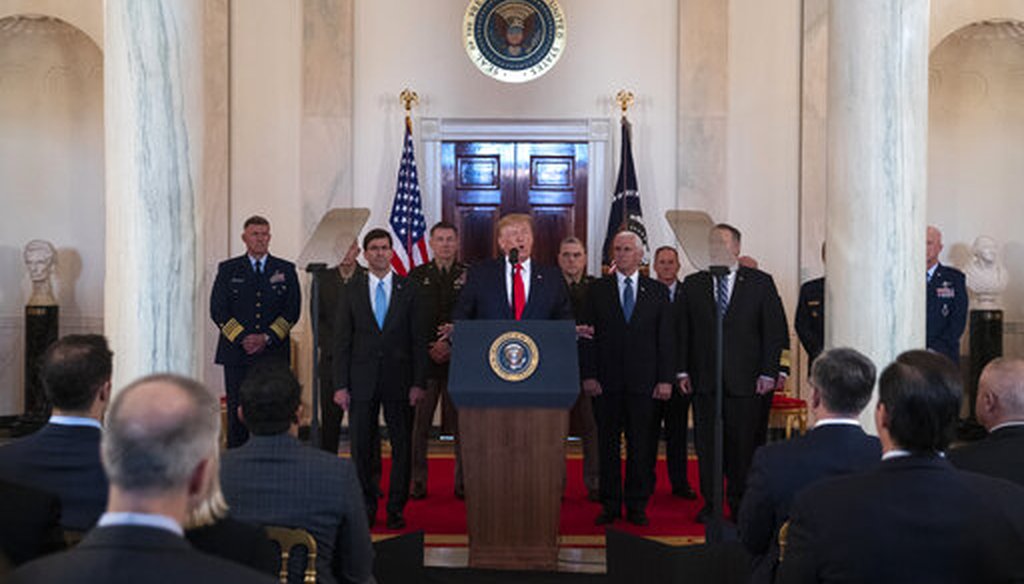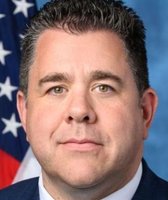Stand up for the facts!
Our only agenda is to publish the truth so you can be an informed participant in democracy.
We need your help.
I would like to contribute

President Donald Trump addresses the nation from the White House on the ballistic missile strike that Iran launched against Iraqi air bases housing U.S. troops, Jan. 8, 2020. (AP/ Evan Vucci)
President Donald Trump said U.S. troops in Iraq had not been harmed by Iranian missile strikes launched in retaliation for a U.S. airstrike that killed one of Iran’s top military leaders, Gen. Qassem Soleimani.
"Our great American forces are prepared for anything," Trump said in a White House address Jan. 8. "Iran appears to be standing down, which is a good thing for all parties concerned and a very good thing for the world."
He also made a number of statements about Soleimani and U.S. relations with Iran. Here’s a roundup of key claims, fact-checked and with additional context.
This is partially accurate. The $150 billion is an exaggerated number that refers to Iranian assets freed under the 2015 nuclear agreement known as the Joint Comprehensive Plan of Action (JCPOA). The assets had been frozen under sanctions. The $150 billion is the highest and least-sourced estimate we’ve found of the freed assets; other estimates vary from $25 billion to $56 billion.
It’s important to note that this money was Iran’s to begin with, not a payment given to it by any government, and little of that money was under the control of the United States or any U.S. bank. Most of those funds were in central and commercial banks overseas.
Sign up for PolitiFact texts
The "$1.8 billion in cash" refers to an amount that U.S. and Iranian negotiators settled on to resolve an arms contract between the United States and Iran that predated the Islamic Revolution in 1979. Iran had paid the United States for military equipment, but the United States never delivered the weapons.
The United States sent Iran the money in euros, Swiss francs and other currencies.
This probably happened around the time the deal was signed — and it would have been routine for Iran, where government-sanctioned Friday prayers sometimes include chants of "death to America," as we’ve noted several times before.
Experts have told us the chant is a revolutionary slogan that amounts to "political theater." In 2015, Iran’s Supreme Leader Ayatollah Ali Khamenei said the chant "means death to the U.S.’s policies, death to arrogance," as opposed to "death to the American nation," per the Guardian.
The Iran deal was signed in 2015 by Iran, the United States, China, Russia, France, Germany, and the United Kingdom, with assistance from the European Union. The New York Times reported that there were "death to America" demonstrations days before the deal was signed.
This is False.
The Iran deal put a cap on enriched uranium that would have lasted until 2030, at which point other agreements would have continued to limit Iran’s nuclear development.
Some of the deal’s restrictions would have eased beginning in 2025, but the key elements that prevented Iran from enriching the levels of uranium needed to make a bomb would have remained in effect until 2030.
Other terms would have lasted forever, including the prohibition on manufacturing a nuclear weapon and a provision requiring compliance with oversight from international inspectors.
The United States is the world’s top producer of oil and natural gas. But this is not a new feat.
The United States has been the world’s largest oil producer since 2012 and the top natural gas producer for years.
It’s not accurate to say the United States has stopped relying on the Middle East for oil and other sources of energy. But the country seems to be moving in this direction. When Trump said in September that "we are very energy independent," we rated his claim Half True.
The United States produced slightly more than it consumed in both fossil fuels and total energy over the first nine months of 2019.
The United States imported some petroleum in 2019 from Persian Gulf countries and countries belonging to the Organization of the Petroleum Exporting Countries, which includes several Middle Eastern nations. But the share of total petroleum imports from both groups has been declining in recent years, with net imports from some Middle Eastern countries also down.
Our Sources
C-Span, "President Trump Address to Nation on Iran," Jan. 8, 2020
U.S. Energy Information Administration, "December 2019 Monthly Energy Review," Dec. 23, 2019
U.S. Energy Information Administration, "Petroleum and Other Liquids, U.S. Net Imports by Country," Dec. 31, 2019
The Guardian, "Iran's Ayatollah clarifies that 'death to America' slogan refers to policies," Nov. 3, 2015
The New York Times, "Obama’s Leap of Faith on Iran," July 14, 2015
See individual fact-checks for links to additional sources.
























